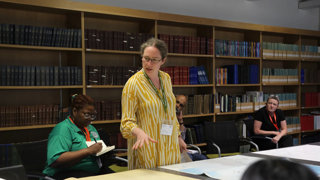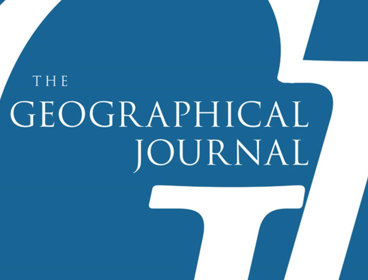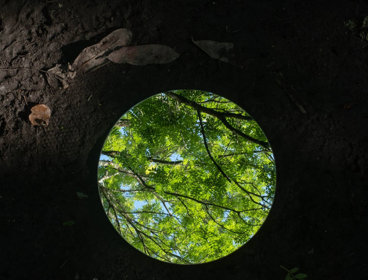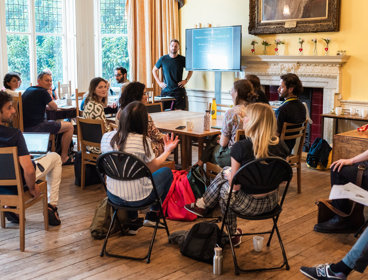Over the past few weeks, we have featured the work of PhD students researching our Collections with funding through the Arts and Humanities Research Council (AHRC) Collaborative Doctoral Awards (CDA) programme.
Our last instalment focuses on the work of Dr Alice Oates, whose Halley Bay project at the University of Cambridge explored the emergence of scientific governance in Antarctica, by focusing on the Halley Bay research station. Halley Bay was established by the Royal Society in 1956 and became a critical centre for observations in global science, including for the discovery of the ozone hole in the 1980s.
Until now, Halley Bay has never fully been investigated. As well as discussing her research, Alice told us about her motivations for applying to the programme, and what she has been up to since completing her PhD.
On her motivations for applying, Alice said: “I had been outside of academia for a few years and was keen to get back into research, but I also wanted some practical experience working with museum and archive collections. Finding a funded project, in the city I was already living in, in the subject that interested me, seemed too good to be true!
"Having that support of the existing project proposal was also very helpful as putting together a full proposal alongside a full-time job, and without the support of an academic mentor, would have been almost impossible for me at the time.”

Alice’s research into Halley Bay involved exploring a range of collections and archives, including at the Society, where she explored papers relating to the planning of Antarctic expeditions, and the extensive holdings of papers, films and scientific instruments at the Royal Society.
Alice said: “Alongside the collections of my partner organisations, I had close access to collections in the Scott Polar Research Institute (my academic institution) and the British Antarctic Survey. These collections varied in size, but I benefitted from a lot of cataloguing work that had been done before me, and the friendly expertise of the archivists, librarians, and museum teams in those institutions.”
Discussing the material she found in the various collections, Alice said: “It ranged from lengthy research station diaries and individual memos, to magazines and formal reports. I even found one gardening report from Halley Bay in the early years, which is not what you expect from a research station built on an Antarctic ice shelf!”
Despite an existing project proposal, Alice found that the programme allowed flexibility for her project to evolve. She said: “I started out wanting to know about Halley's science, but as things progressed, I became more and more interested in Halley as a place where people live and work. This allowed me to explore ideas that I hadn't predicted at the start of the project, such as connections between place and identity, Antarctic settler colonialism, and the push-and-pull between state- or institution-scale goals and the lived reality on the ice.”
Alice’s interest in exploring lived experience in Antarctica continued after completing her PhD. She was awarded a Fellowship through the Scientific Committee on Antarctic Research to develop an agenda for disability-focused research in Antarctic humanities and social sciences.
Alice commented: “The Fellowship led directly from my doctoral research in which I began to think about who goes to Antarctica, and what biases might be at play in the concept of an ideal Antarctican”.
After spending six months talking to experts in the field and conducting a community survey and literature review, Alice is hoping to publish a paper next year, filling the gap in disability-focused research. Alice said: “This will represent the first systematic attempt to understand evidence needs relating to disability inclusion in the international Antarctic sector, and I'm really excited about it.”
Alice is now working as Evidence Manager at the Royal National Institute for Deaf People (RNID). She told the Society: “I’m hugely enjoying the job, and I wouldn't be doing it without my CDA experience and the professional development opportunities it afforded me. It's a really tough time for academic careers, and I'm immensely grateful to be doing interesting and useful work that makes use of my research skills.”
You can find out more about her work on Alice's website.
Discover upcoming Collaborative Doctoral Research opportunities and read about previous and current CDA projects.




